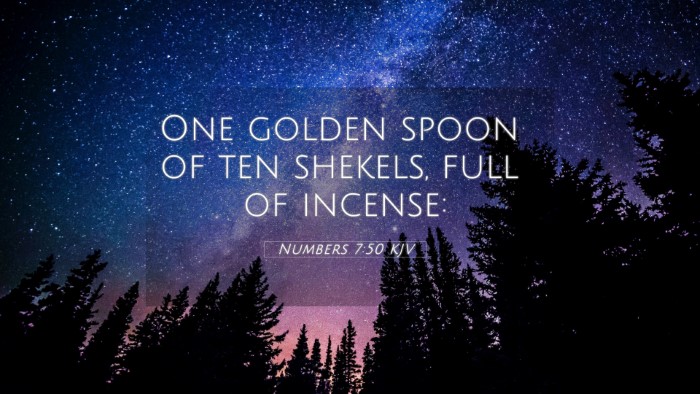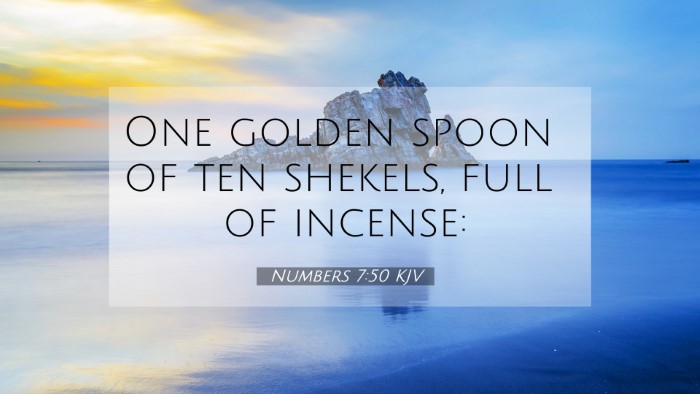Bible Verse Meaning of Numbers 7:50
Verse Text: "One gold dish of ten shekels, full of incense." - Numbers 7:50
In Numbers 7:50, the detailed account of offerings brought by the leaders of each tribe during the dedication of the altar is outlined. Specifically, the mention of a gold dish full of incense signifies a significant act of worship, as incense symbolizes prayer and the presence of God.
Contextual Overview
The context of Numbers 7 establishes a ceremonial and liturgical framework within which the Israelites are instructed on how to consecrate the altar and their offerings. Each leader brings their contributions, showing a collective effort in honoring God. Understanding this verse requires looking at various cross-references and insights from respected public domain commentaries.
Commentary Insights
-
Matthew Henry:
Matthew Henry emphasizes the importance of offerings in worship and that the gold dish was not just a vessel but a representation of their devotion to God. He notes the significance of each leader participating in the offering, reflecting unity among the tribes.
-
Albert Barnes:
Albert Barnes highlights the weight and quality of the materials used for the offerings, illustrating the value placed on worship. The ten shekels suggest that the gift was of considerable worth, indicating the seriousness with which the people approached their worship practices.
-
Adam Clarke:
Adam Clarke discusses the symbolic nature of the incense, representing the prayers of the people rising to God. This gold dish was essential in the ceremonial acts, reminding the Israelites of their need for divine favor and mercy.
Symbolism of the Gold Dish and Incense
The gold dish is a powerful symbol of purity and sanctity. The offering of incense parallels other biblical instances where incense is significant, such as in Exodus 30:1-10 and Revelation 5:8, where prayer is compared to incense before God.
Related Bible Cross References
- Exodus 30:1-10 - Instructions for the altar of incense.
- Psalm 141:2 - The lifting of prayers like incense.
- Revelation 8:3-4 - Angels offering incense with prayers of the saints.
- Leviticus 16:12-13 - The role of incense in atonement.
- Matthew 2:11 - The Magi offering gold, frankincense, and myrrh.
- Luke 1:10 - Prayers of the people ascending as incense during worship.
- Hebrews 9:4 - The items in the tabernacle, including the golden censer.
Connecting Themes Across Scripture
The act of offering incense and valuable items can lead to a deeper understanding of the themes of worship throughout the Bible. For example, in the Old Testament, the significance of tangible offerings is emphasized, while in the New Testament, the emphasis is on the heart's posture in prayer rather than the physical act.
Conclusion
Numbers 7:50 serves not only as a historical record but also as a profound reminder of the importance of sincere worship and dedication to God. Cross-referencing this verse with others reveals the continuity of these themes throughout Scripture, enhancing our understanding and connection to God’s desire for communion with His people.
Tools for Bible Cross-Referencing
For those interested in exploring the connections between various Bible verses and understanding themes more deeply, utilizing a Bible concordance or a Bible cross-reference guide can provide valuable insights. Engaging in cross-reference Bible study practices helps in discovering the rich inter-Biblical dialogue present throughout the scriptures.
Additional Resources
For further study, consider looking into Bible chain references that can help identify thematic connections across the Old and New Testaments or examining cross-referenced themes for sermon preparation. Such approaches facilitate a comprehensive understanding of biblical texts, enabling a richer spiritual experience.


